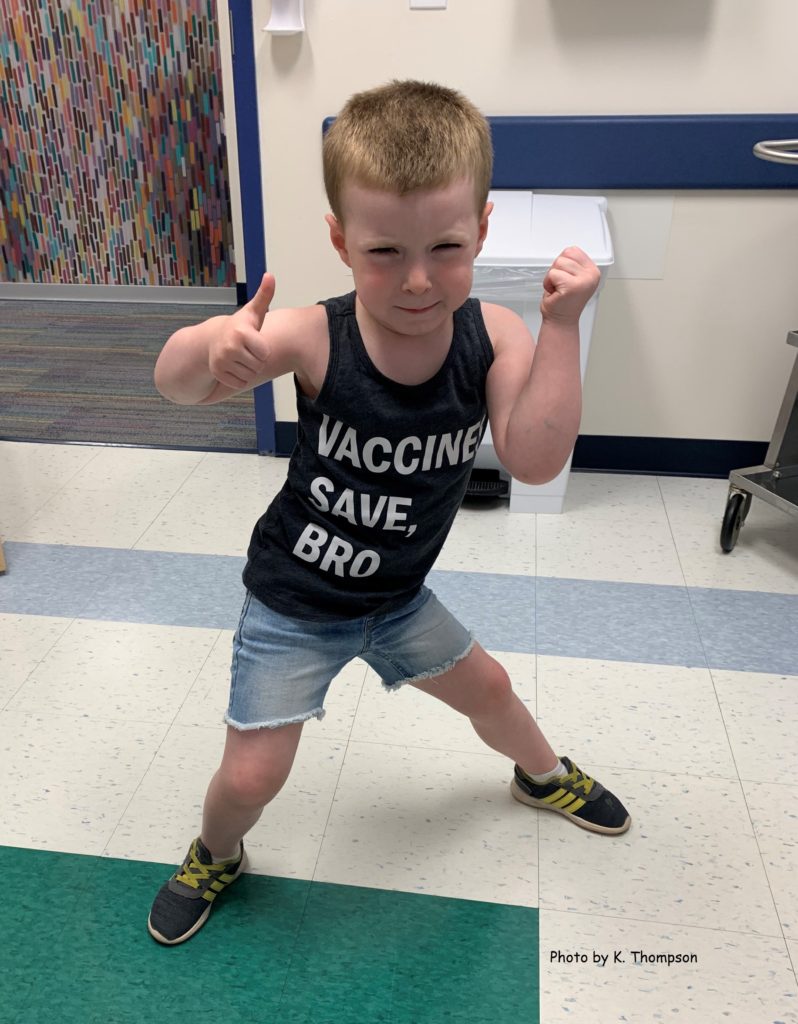Flu vaccine 2019-2020

Excited for his Germ Fighters, this kiddo wears his “Vaccines save, bro” shirt for all of his pediatric office vaccine visits.
The US flu vaccine 2019-2020 is here!
Who should get it?
Unless medically contraindicated, all kids aged six months and older should get the flu vaccine. Your child’s pediatrician will ask you questions to be sure the flu vaccine is appropriate for your child.
Is the flu vaccine different this year from last year?
Yes, so even if your child received a flu vaccine last year, they should get another one this year. The predicted flu strains change yearly so manufacturers make up a new batch of flu vaccines every year.
Which flu vaccine should they get- the shot or the-spray-in-the-nose kind?
All kids can get the shot. Kids two years and older without certain other medical conditions can get the nose spray. If your child is eligible for both, then the best type to get is the one that is available- they are both effective.
When should they get the flu vaccine?
The goal is to be completely immunized for this year’s flu season by Halloween- the end of October. When it comes to the flu vaccine, “better late than never” also holds true. It is impossible to predict precisely when the flu will hit and how long it will circulate. So even if it’s mid winter, get the vaccine if it is still available.
How many doses do they need?
If your child is under the age of nine years and never had a flu vaccine or had only one prior dose of flu vaccine before the date of June 30, 2019, then they need two doses separated by a minimum of four weeks. All other kids need one dose only every year.
What are the common side effects of the flu vaccine?
The injectable brands of flu vaccine, like all shots, can cause mild symptoms such as soreness or redness in the body area where a child gets the shot, fever, or fatigue. The nasal spray version can cause some nasal congestion, sore throat, fever, and muscle aches.
Can any flu vaccine cause the flu?
No.
You can read a summary about the nasal spray form of the flu vaccine here and well as the injectable form of the flu vaccine here. Both of these Vaccine Information Statements expand on all of the above points.
Still on the fence about flu vaccine 2019-2020?
Last year, 116 children in the US died from the flu, and almost half of these children were previously healthy kids. The average age of death was six years. Of those who died and COULD have received flu vaccine- meaning the ones that were older than 6 months of age, 70% did NOT receive the flu vaccine. So flu vaccine might have averted more than half of these flu deaths.
Additionally, of children last year in the hospital with flu, the majority did NOT receive flu vaccine. The flu killed thousands of adults last year. School-aged children are the group most likely to spread the flu germs. Therefore, flu vaccine not only can protect your children and those too young or too ill to be vaccinated, but also protects your children’s grandparents.
Click here for an exhaustive review of the American Academy of Pediatrics recommendations for this year’s flu season. We hoped to provide you all with the most important highlights. You can read our flu vaccine myth-busters here.
Julie Kardos, MD and Naline Lai, MD
©2019 Two Peds in a Pod®
